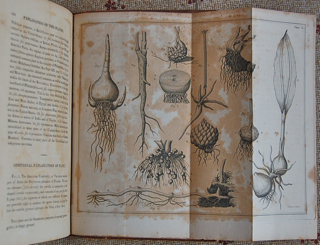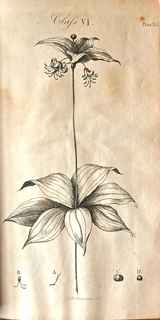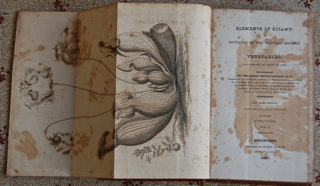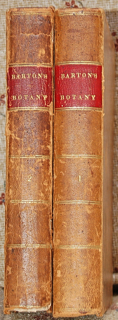Barton, Benjamin Smith.
Elements of Botany: or Outlines of the Natural History of Vegetables. Illustrated by Forty Plates.
back

|
Seller ID: 1083 Philadelphia: Robert Desilver, 1827. Third edition, complete, corrected and greatly enlarged, in two volumes (xii, 324, plates, Index; iv, 180, Appendix (1-16), Expanation of Plates (1- 41), plates, Index). Forty engraved plates, some folding. Octavo in full leather, gilt decoration and titles to spines. Covers with a stain or two, worn at the extremities, hinges on volume two cracked but holding; previous owners' name and bookplates, endpapers foxed; frontis to volume one offset onto title page, several plates bound at rear moderately offset; moisture tideline through a few pages front and rear of volume two; several pages of preface to the second edition misbound into text of first preface; text generally clean and sound throughout. A later, expanded edition of Barton's botany, the first produced in North America and a model for later botanical works. It was this botany (although not this edition) Lewis and Clark took on their explorations into the American west. Benjamin Smith Barton, M.D., (1766-1815) was professor variously of materia medica, natural history, and botany at the University of Pennsylvania and a member of the Linnaeen Society, the American Philosophical Society, and the Society of Antiquaries of Scotland, among others. Barton's principal work is Elements of Botany (1804), a later edition of which we offer here, the first botany text published in the U.S. His wide ranging interests in natural history led him to publish a number of monographs and studies, e.g., 'The Fascinating Quality Ascribed to the Rattlesnake' (1796) and 'New Views of the Origins of Tribes in the United States' (1797). Barton acted as advisor on botanical collections to Lewis and Clark and was acquainted with Thomas Jefferson and William Bartram. His nephew William P.C. Barton (1786- 1856) was the author of the important A Flora of North America (1821-1823), for which see our book number 442. Benjamin Smith Barton's Fragments of the Natural History of Pennsylvania (1799) was 'intended to illustrate... the Natural History of a Country extremely interesting to philosophers and hitherto very imperfectly explored.' These fragments, not quite twenty-five pages of field observations, together with introductory speculations about such matters as the range of the Carolina Parrot and the 'conformity between the vegetation of some plants and the arrival of certain birds of passage' suggest a systematic natural history based on local observation, rather like the Christmas bird count. On the other hand, certain passages in Fragments preserve a reliance on classical authority so that natural history is conducted as a literary, historical study of the texts of ancient received opinion, as in this curious note on the origins of bees and the procurement of honey: "It appears to have been a very general opinion among the ancients, that bees were produced from the putrid bodies of animals.... The Greeks believed, that these animals arose from putrid bullocks.... So rude were the opinions of the ancients respecting the origin of these insects. It is certain, however, that [according to accounts in the Old Testament and in Virgil's Georgics] putrid carcases are often visited by bees, and it is not unlikely that from these carcases, they may be able to procure honey" (xi). See our book number 767 for more. Quite a decent copy of an important and surprisingly scarce book. Price: $750.00
For more information or to place your order, you can email us at info@trilliumbooks.ca, telephone us at 705-749-0461, |







